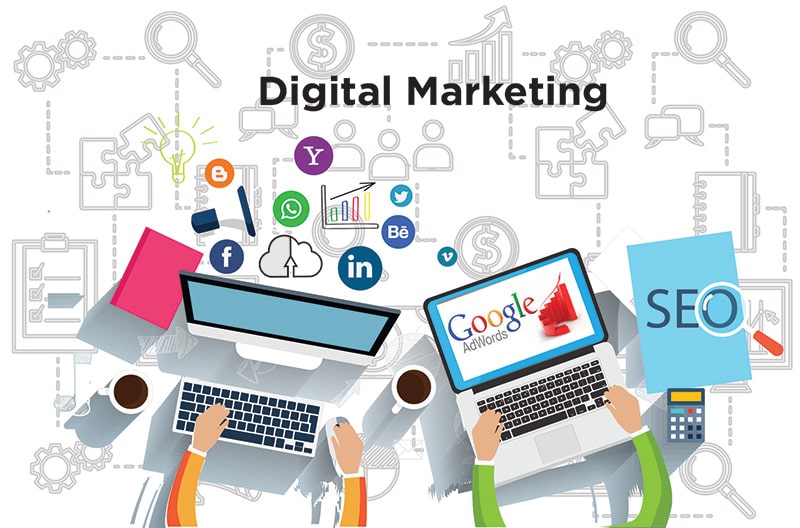The Evolution and Impact of Digital Marketing
BusinessDigital marketing has fundamentally transformed the way businesses communicate with their customers and reach new audiences. Over the last few decades, the rise of the internet has paved the way for companies to leverage digital tools to engage potential clients, enhance brand visibility, and drive sales. The shift from traditional advertising methods like print, television, and radio to online marketing has been swift, largely driven by the increasing reliance on technology and mobile devices. Digital marketing now encompasses a wide range of techniques, including social media, search engine optimization (SEO), email marketing, and content creation, offering businesses unprecedented ways to connect with a global audience. As a result, digital marketing has become an essential element in any business strategy, allowing companies to remain competitive in a rapidly evolving marketplace.
A key advantage of digital marketing is the ability to target specific audiences with a precision that was impossible with traditional marketing. Through platforms like Google Ads and Facebook Ads, businesses can tailor their marketing campaigns to reach users based on factors such as age, location, interests, and online behaviors. This level of targeting ensures that the right message reaches the right audience, maximizing the potential for conversion. Unlike traditional advertising, where a commercial or print ad might reach a broad, uninterested audience, digital marketing allows companies to refine their strategies to target only those most likely to engage with their brand. This personalized approach not only increases efficiency but also builds stronger relationships with customers, as they receive content that is more relevant to their needs and interests.
In addition to audience targeting, one of the most important features of digital marketing is the ability to track and measure results in real time. Unlike traditional methods, where the impact of a marketing campaign may not be clear for months, digital platforms provide immediate insights into how well a campaign is performing. Marketers can see how many people have clicked on an ad, visited a website, or made a purchase, allowing them to quickly adjust strategies if necessary. This data-driven approach ensures that companies can optimize their marketing efforts to get the best possible return on investment (ROI). For businesses, especially small and medium-sized enterprises, the ability to measure success is crucial in making informed decisions about future campaigns and allocating resources efficiently.
Social media plays a pivotal role in the digital marketing landscape. Platforms such as Instagram, Facebook, and Twitter have become critical tools for businesses to interact with customers, create brand awareness, and foster loyalty. Social media allows companies to share real-time updates, promote products, and engage directly with followers in a way that builds community and trust. For many businesses, social media is not just a marketing tool but also a customer service platform where users can ask questions, provide feedback, and interact with the brand in a personal and direct manner. The real-time nature of social media also means businesses can react quickly to trends and feedback, adapting their strategies to meet the shifting demands of their audience. This interactive approach helps build stronger, more loyal customer relationships.
Content marketing is another essential component of digital marketing that focuses on creating valuable, relevant content to attract and engage audiences. Whether through blog posts, videos, infographics, or podcasts, content marketing is about providing users with information that answers their questions, solves their problems, or entertains them in some way. Effective content marketing helps establish businesses as thought leaders within their industry, improving brand credibility and driving traffic to their websites. Content marketing also plays a vital role in SEO, as high-quality, relevant content helps businesses rank higher in search engine results, making them more visible to potential customers. In a digital landscape where consumers are bombarded with information daily, content marketing offers a way to cut through the noise and deliver real value to audiences.

Email marketing remains one of the most effective tools in jasa iklan instagram pakar, allowing businesses to connect directly with their customers through personalized messages. Unlike social media, where posts can easily be missed or ignored, emails land directly in the inboxes of potential customers, offering a more intimate and direct form of communication. Email campaigns can be used for a variety of purposes, from promoting new products to sharing company news or offering discounts. When done correctly, email marketing helps build a loyal customer base by fostering ongoing relationships and keeping customers informed and engaged with the brand. Moreover, the use of segmentation and personalization in email marketing ensures that recipients receive tailored messages that resonate with their specific interests or buying behavior, making this method highly effective in driving conversions.
In conclusion, digital marketing has revolutionized how businesses reach and engage their audiences. Its flexibility, precision targeting, and measurable results make it an indispensable tool for modern businesses looking to succeed in a competitive market. From targeted ads and social media interactions to valuable content and email campaigns, digital marketing encompasses a wide range of strategies that can be tailored to any business model. As technology continues to evolve, digital marketing will only become more sophisticated, offering even more ways for businesses to connect with their customers and grow their brand. In the fast-paced digital world, businesses that invest in effective digital marketing strategies are better positioned to thrive, remain relevant, and foster lasting customer relationships.
